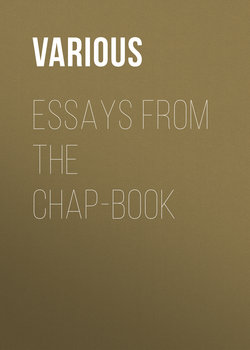Читать книгу Essays from the Chap-Book - Various - Страница 6
The Bureau of Literary Revision
By
Alice Morse Earle
ОглавлениеTHE BUREAU OF LITERARY REVISION
OUR beloved friend Charles Lamb once wrote of his Essays of Elia: —
“One of these professors, on my complaining that these little sketches of mine were anything but methodical, and that I was unable to make them otherwise, kindly offered to instruct me on the method by which the young gentlemen in his seminary were taught to compose English themes.”
When, with the solemn thoughts brought to each soul at the “turn of the year,” we recount to ourselves our many mercies, let us never fail to remember with gratitude that the magnanimous offer of that seminary professor was never accepted.
We do not have to wait to-day for chance offers from solemn professors of instruction and revision in literary composition; “the method by which young gentlemen in the seminary are taught to compose” is thrust upon us at every hand. “Bureaus of revision” and “Offices of literary criticism” abound and thrive and become opulent through examining, correcting, and revising the work of confiding authors. We are told with pride that in one bureau alone three thousand manuscripts a year were thus revised. Among those three thousand young fledglings of authors there may not have been a Charles Lamb, but the lamentable thought also will arise that there may have been a Charles Lamb, and that his unmethodical little “sketches” may have been pruned or amplified, or arranged and revised till they proved true “English themes.”
There is a wearying monotony in the make-up of many of our periodicals, some of those even of large circulation. There is a lack of literary color, a precise and proper formation of each sentence, and a regularity of ensemble which is certainly grammatical but is fully as uninteresting as grammar. A surfeit of these exactly formal “English themes” has made the gasping public turn to some of our literary freaks and comets with a sensation as if seeking an inspiration of fresh air after mental smothering.
I attribute this too frequent monotony, and even stultification of composition, to the “literary reviser” – the trail of the serpent is over all our press.
And what does this literary revision offer for the large fees paid? One alleged benefit is the correction of punctuation. It certainly performs this service; but the editor and proofreader in any responsible publishing-house will, as a duty, correct with precision the punctuation of any paper or book printed by the house. A benefit alleged by one circular is “a pruning of too riotous imagination.” I groaned aloud as I read this threat. Too riotous imagination to-day! when we long for imagination and long in vain; when a wooden realism thrusts its angular outlines in our faces from every printed page. “To curb the use of adjectives” is another of the reviser’s duties. The meagre style too often seen of late may arise from this curbing.
The most astonishing aspect of this bureau of revision is shown in the patience with which authors endure its devastations. They confidingly send into this machine the tenderly nourished children of their brains, dressed with natural affection in all the frills and ruffles of rhetoric, and receive them home again with ornaments torn away, laid in a strait-jacket which has been cut with rigid uniformity, and made with mathematical precision – and yet they kiss the rod that turned the natural children of their brains into wretched little automatons.
I would not judge all revision bureaus by one; but I must give my experience at the hands of a very reputable one. I had written four books of more than average sale, and had been ever commended by the press for my grammatical construction, when I sent to a bureau for criticism a short magazine-paper. It was returned to me full of very large and legible corrections – or rather alterations such as these: Where I wrote of my heroine being dressed in, etc., my reviser placed gowned in; where I wrote the little child, the reviser altered to the young babe; where I said nothing happened after this, to my horror, in heroic blue-pencilled letters, I read my pet aversion, nothing transpired. Where a compound sentence contained several clauses with verbs in the past tense, all dependent clauses were made participial in form; not always to the advantage in elegance, never of moment or indeed of real difference in grammatical construction.
I must confess that I did not send to this bureau my real name, as palpably too well known to men of literary ilk. My three dollars’ worth of advice was contained in a single sentence: “Your style is fair, but commonplace; if you practise literary composition you may succeed; but this article is, in our judgment, not salable.”
I had the pleasure of sending the paper immediately to a well-known magazine and receiving therefrom in payment a check for fifty dollars.
